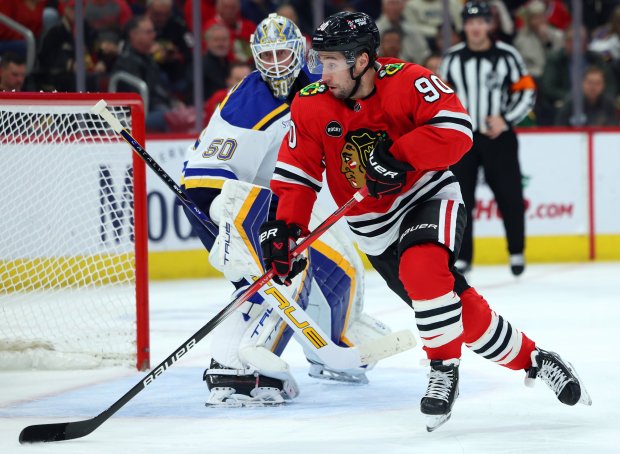In the summer of 2021, then-Chicago Blackhawks general manager Stan Bowman reversed plans for a rebuild and tried to give a jolt to the roster led by Patrick Kane and Jonathan Toews by adding some pieces for a playoff push.
Bowman traded for Tyler Johnson, a plain-spoken forward with two Stanley Cups under his belt.
He also acquired Seth Jones, one of the league’s most talented defensemen at the time, and goalie Marc-André Fleury, a soft-spoken but congenial three-time Cup winner.
In the fall of 2021, everything went south.
The Brad Aldrich scandal — based on 2010 sexual assault and harassment allegations by former player Kyle Beach — gave the organization a black eye, and Bowman was out the door.
The Hawks got off to a 1-9-2 start and then-coach Jeremy Colliton was gone. Kyle Davidson replaced Bowman, and a true rebuild was on.
It wasn’t what either Johnson or Jones were expecting, and it remains the same to this day.
“I’ll be honest, if you can see into the future three months, with the position I was in, I don’t know if I would have,” Jones said before trailing off. “This is a great organization, but I didn’t really want a rebuild when I left Columbus.”
Johnson said, “I’ve met a lot of good people, but it wasn’t exactly what I had envisioned or wanted.” He will become an unrestricted free agent July 1, and he talked about moving on.
Lesson or cautionary tale, expectations changed.
The Hawks are at that crossroad again. But this time, two years into the rebuild, expectations have to change.
Everyone from management to the players acknowledges it.
“There needs to be a progression,” Davidson said. “We can’t finish second-last in the league. I think the standard has to be raised. The expectation has to be raised. Through that, accountability will be raised. That’s the nature of the path we’re on.”
Davidson added, “Previous to this year, we finished third (to) last. This year, we finished second (to) last. That can’t happen again. We need to start moving up and onward.”
The Hawks, which got a league-high 21.8% of their offensive production from rookies, finished 23-53-6, trailing only the San Jose Sharks
“How do we get there?” coach Luke Richardson asked rhetorically. “I’m sure we’re going to look at free agency and trying to get some good guys that can surround these guys and help them get to that next step and be a part of it at the same time.”
The players are almost demanding it.
Jones said, “I would tell management today, ‘Go sign a bunch of free agents.’ Or go do this, go do this. But it’s not up to us. It’s up to them.”
However, there appears to be more urgency this offseason.
Nick Foligno said, “I understand we’re in a rebuilding phase … but I don’t want to be one of those teams that’s rebuilding for five, six years. Not for selfish reasons, just that’s not how you really grow a winning culture.
“You can’t be in that cycle for so long.”
Through hours of end-of-season interviews with reporters at Fifth Third Arena, the players, Richardson and Davidson painted a picture of what the roster needs to take the next step toward becoming a contender, and it boils down to these attributes: skill, self-sacrifice and accountability.
Some of these attributes overlap, but all agreed that making strides in those areas will raise the standard of how the Hawks play next season.
‘Do we need an (ass) in the room?’
During the Hawks’ Cup years, the captain, Toews, was the designated leader, who threw an arm around every rookie or new player in the locker room.
“Every single year that the young guys … ever had to lean on somebody, it was Tazer,” Dickinson said.
Meanwhile, players like Brent Seabrook were the kick-in-the-pants type.
Accountability comes in different forms.
“You need characters,” Nick Foligno said. “I actually learned that from Torts (infamously fiery coach John Tortorella), who was a character himself.
“He’s like, ‘I don’t want all the same players. I like when there’s a guy who’s got a little swagger to him.’ … You don’t want all the same types of mindsets. You need to have a little bit of friction in there sometimes, guys that don’t maybe see things the same way.”
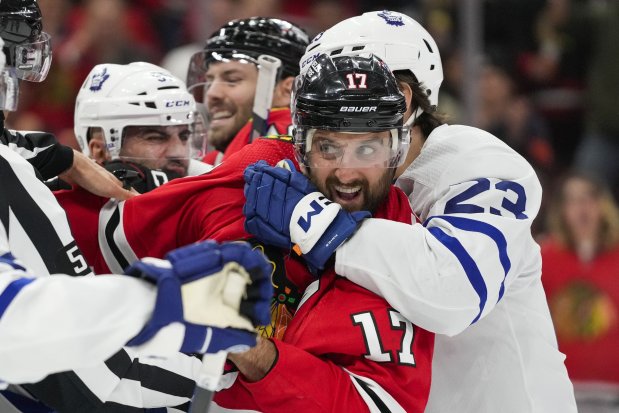
Foligno is vocal, while also fatherly. Jason Dickinson gives tips to teammates and lets his play say the rest. Jones and Connor Murphy are quieter, more subtle, but are the leaders who transitioned the team from the Toews era.
“Nick has done a good job of talking through the group and making sure that the young guys understand that what we’re doing some nights wasn’t acceptable,” Dickinson said of Foligno, “so he took his role really seriously and he wanted to be that voice, he wanted to help correct things cause he knew what he was seeing wasn’t right, and he’s been around for a while, so he’s seen a whole lot of things.
“He’s maybe wearing it a bit too much on his sleeves at times, because it definitely takes a toll on him.”
As temperament goes, all of those veterans are on the nice side, as one reporter suggested, so the question was asked: Does having a jerk fill a necessary role in a modern locker room?
“‘Do we need an (ass) in the room?’” Jones pondered the reporter’s question. “But I do think it’s important that there is a guy in the room — and you can call him an (ass) — that will tell you how it is and is not afraid to do that.
“Do we need one of those guys? Maybe we do. I’ve fought to try to not do that sometimes, even though it’s necessary. … You’re talking to the guys about how we can make this thing better, there has to be someone in there that will tell you just how it is. We can call it an (ass), but I think that’s one of the more important guys in the locker room.
“He can look everyone in the eye and say, ‘You’re not doing a good enough job.’”
Other players, and even Jones, say it’s a fine line to walk. The straight-shooter risks alienating teammates if he’s shooting too often.
Foligno said, “Sometimes you need a little snarl or different kind of — not a jerk — but just somebody that brings juice. I always talk about you need juice, you need mojo, a guy that brings energy.
“They’re hard to find. When they walk in the room, you know who they are. They’re loud or they bring a presence. You don’t need 100 of them, but you definitely need a few.”
“Do we need an A-hole in the room? … You can call it an A-hole, but that’s one of the more important guys in a locker room, can look everyone in the eye and say, ‘You’re not doing a good enough job.’”
—Seth Jones pic.twitter.com/C9ttm935sB
— Phillip Thompson (@_phil_thompson) April 20, 2024
‘I love workers, but you also have to have some talent.’
This season was a reality check: Grinders can only get you so far.
Granted, a slew of mid-season injuries forced the Hawks to call up some prospects before their time and move other players up the lineup, but the Hawks finally admitted the roster has been stocked with try-hard depth guys who are probably over their skis given what they’ve been asked to do.
Foligno said, “It’s not that no one wants to do it, I just think some guys just didn’t know how, right? Like, we had a lot of guys come up that had to play in different roles, we had a lot of new faces, young kids that have never experienced the NHL.”
“You’ve got players playing in the wrong roles and lots of maybe players coming up a little bit too early,” Richardson said. “And it’s not an excuse, it’s just what we had to deal with.”
“You have to surround guys like Connor (Bedard) and (Frank) Nazar (with players) that can play at a high level of skill,” he added. “I love workers, but you also have to have some talent to go along with that, and have a good balance in that.
“So I think we’re probably going to look for both.”
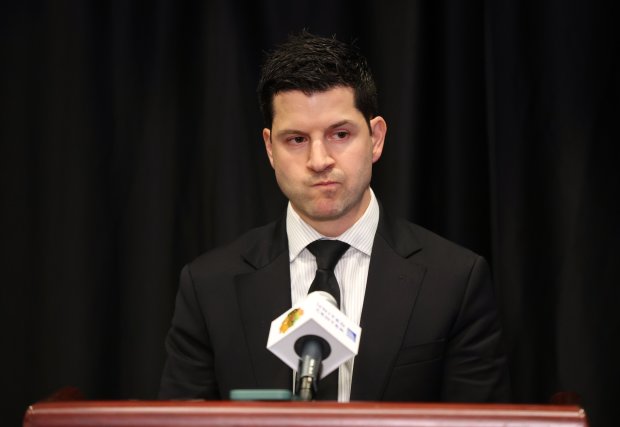
That’s where Davidson comes in.
“There is a team-building aspect to taking the next step,” Davidson said. “Having said that, you’re somewhat bound by how much you can change and how much you can add.
“We can say, ‘I want this, I want this, I want that.’ But if none of that’s available, then there’s nothing we can do, you know?”
It’s understandable. The Hawks are projected to have about $38 million heading into cap space next season, according to CapFriendly.com, but Davidson is reluctant to go on a spending spree at the cost of the hard-won financial freedom.
“We can’t do something that’s going to eventually, down the road, hurt us — in that this talent that’s coming up, that may or may not be ready for NHL action, we can’t do something that’s going to hinder our ability to allow them a roster spot when they’re ready,” he said.
Yes, a team can’t be saddled with a big contract before it’s time (fans constantly harp about Jones’ $9.5 million salary cap hit), nor do they want to block the path of their highly prized prospects, but standing pat isn’t an option.
The Hawks have a lot of draft capital for trades. Davidson has swung the impossible trade (Brandon Hagel for two first-round picks) and unearthed diamonds that blossomed when given bigger roles (Sam Lafferty and Dickinson, for example).
It’s Davidson’s job to thread the needle and find that guy who serves the long-term goal in some way; that forces the next stage of the Hawks’ evolution.
“It has to start with me,” Davidson said, “on down to the coaches, coaches to the players, and it has to cascade down that way. Are we going to bring in some new players? I think that’s likely.
“Yeah, there’s going to be turnover. Who’s available, what you can get? That’s yet to be determined.”
‘Everyone’s going to do that to look out for themselves.’
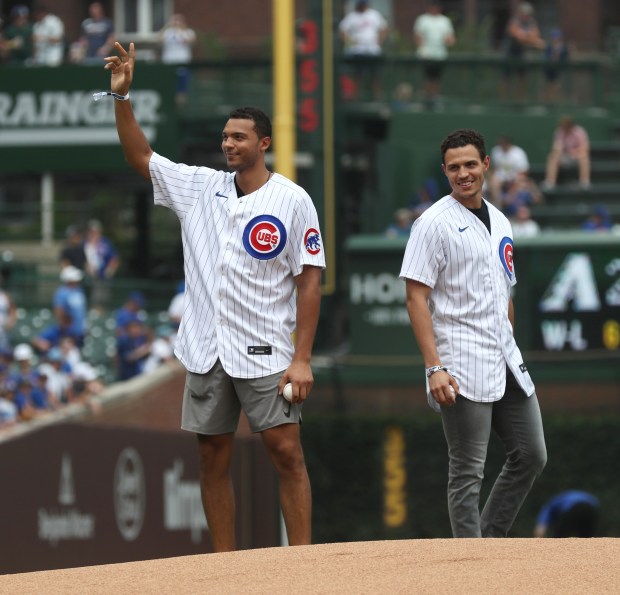
Players can spout all the platitudes about sacrifice, “know your role” and “do it for the team,” but in the end the team will always dispatch them when they no longer serve a purpose — or someone else can do it who’s better, younger or cheaper.
“It’s a business” works both ways.
Jones saw how it affected his brother, Caleb, who spent two seasons with Seth in Chicago before landing in Colorado.
“It’s very natural,” Seth Jones said. “Caleb was on a one or two-year deal. If you haven’t gotten a point in a while, you are thinking about that. It’s just human nature. You don’t play forever, so you’re constantly thinking about your next deal. You’re talking to your agent away from the rink.
“Not saying you bring that into the rink, through your personality or the things you say, but sometimes you can tell in a hockey game. Maybe it’s harder for (the) media to tell, and it probably is, but when you’re down there on that ice, you feel it.”
And sometimes the team can feel it.
For all the talk of culture-building, Jones has seen a revolving door through the Fifth Third.
This offseason alone, three of the seven-man defensive group will become unrestricted free agents, and even his partner, Alex Vlasic, will become a restricted free agent.
“When you have a team of one-year deals, it’s extremely difficult to get everyone on the same page of a common goal,” Jones said. “Everyone wants points, everyone’s going to do that to look out for themselves.”
“That narrative is tough for me,” Foligno said, “because I think being a good pro is understanding you have a job to do, regardless of what contract (you have).
“Sometimes guys have their best years with a one-year deal. If you look at the Vegas Golden Knights, the first year, there were a bunch of misfits, cast-offs, and they go on to the Stanley Cup Final and have a great season.”
Still, Foligno is likely the most mature Hawk at age 36.
And even he doesn’t deny the Hawks may talk the talk of accepting certain roles, but they’re not always walking the walk.
“It’s pretty easy to see and say,” Dickinson. “We have video evidence of it all. We can go back and watch it the next day.
“There’s no hiding when it comes to saying certain things and doing others, because we get to watch it, we get to analyze it, we get to pick it apart. So accepting roles, playing to them, it’s hard when you have certain expectations for yourself.”
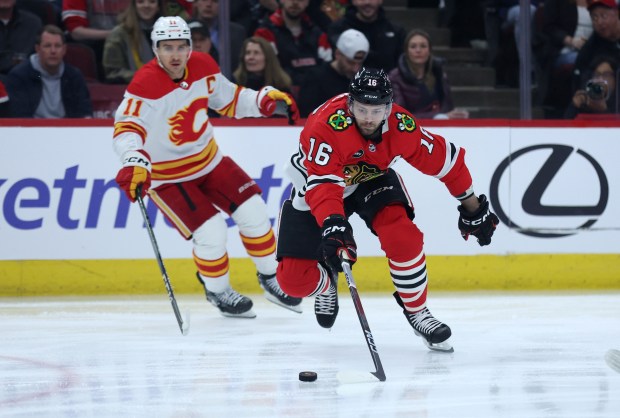
Dickinson, drafted No. 29 by Dallas in 2013, can relate.
“It’s very easy to get wrapped up in that and start thinking: ‘I’m going to be this big shot, I’m going to start scoring all the goals, I’m going to put up all the points.’ That’s not necessarily the case.”
That trickles down to guys hanging onto jobs or playing for their next contract.
Jones said, “I don’t think it’s something you develop, it’s something you want to do. You have to want to be F1 and go hit that defenseman. You’re not going to touch the puck, probably, but you’re going to make that guy’s life hell.
“You have to want to block a shot, you have to want to do the right thing, even (though) it’s not the glory thing to do. It’s not a goal, it’s not a saucer pass.”
Jones said he and Foligno have talked about the type of players the Hawks need and gave them a name: “We call them ‘identity pieces.’”
“We need guys that want to play 10-12 minutes on a fourth or third line, go out there, do his job, be happy that the team won without scoring a goal or getting a point,” Jones said. “He does a good job, gets off, doesn’t complain about his ice time — he doesn’t care about that, he just wants to see the team win.”
When offense stalled, too often the Hawks got lured into the trap of playing hero hockey, trying to force a place.
It affected a lot of the players, even the ones who already have the glory roles, like Bedard.
Richardson said Bedard, particularly early on, was guilty of “trying to do a little too much at the wrong time is maybe not helpful in this league. Cut your loss short and get off the ice. That’s more important to help the team than it is to stay out a little extra and do something a little extra by yourself when no one else knows what’s going on and putting yourself in a little bit of hot water.
“That’s the first time he’s ever been exposed to it. So it’s understandable,” Richardson said.
Where do the Hawks go from here?
Davidson and Richardson have talked about bringing in more help, whatever form that takes.
“This is all so speculative at this point,” Davidson said. “Yeah, we would like to bring in some players to help push the team forward to some extent, but what does that look like? You just don’t know who is going to be available.
“It’s just so early. You’ve got to get to July 1 for the free agents and then you’ve got to let all these other teams finish to talk about what their plans are for the offseason.”
The Hawks have two first-round draft picks this summer, but even if either makes the roster, that’s just another teammate who will need mentorship.
It may be a small first step, but Richardson wants to start with things he can control, like practice.
“We’ve had some conversations this year about practice,” Richardson said. “Maybe we do practice a little shorter but harder next year. … So every time we step on the ice they know it’s going to be ‘go.’ It’s 100 miles an hour and it’s competitive.
“And there’s no easing into practice because sometimes you start a game and subconsciously you’re like, ‘Oh, man, I’m going to ease into the game, and it’s 3-nothing.’”
Richardson acknowledged he and his staff should’ve identified the problem sooner.
But it’s a proactive way of looking at accountability, rather than a postmortem of what went wrong and who should’ve done what.
“If we don’t do it right (in practice), blow the whistle, more accountability, and stop things,” he said.


